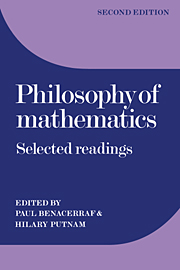Book contents
- Frontmatter
- Contents
- Preface to the second edition
- Introduction
- Part I The foundations of mathematics
- Part II The existence of mathematical objects
- Part III Mathematical truth
- The a priori
- Truth by convention
- Carnap and logical truth
- On the nature of mathematical truth
- On the nature of mathematical reasoning
- Mathematical truth
- Models and reality
- Part IV The concept of set
- Bibliography
Truth by convention
Published online by Cambridge University Press: 05 June 2012
- Frontmatter
- Contents
- Preface to the second edition
- Introduction
- Part I The foundations of mathematics
- Part II The existence of mathematical objects
- Part III Mathematical truth
- The a priori
- Truth by convention
- Carnap and logical truth
- On the nature of mathematical truth
- On the nature of mathematical reasoning
- Mathematical truth
- Models and reality
- Part IV The concept of set
- Bibliography
Summary
The less a science has advanced, the more its terminology tends to rest on an uncritical assumption of mutual understanding. With increase of rigor this basis is replaced piecemeal by the introduction of definitions. The interrelationships recruited for these definitions gain the status of analytic principles; what was once regarded as a theory about the world becomes reconstrued as a convention of language. Thus it is that some flow from the theoretical to the conventional is an adjunct of progress in the logical foundations of any science. The concept of simultaneity at a distance affords a stock example of such development: in supplanting the uncritical use of this phrase by a definition. Einstein so chose the definitive relationship as to verify conventionally the previously paradoxical principle of the absoluteness of the speed of light. But whereas the physical sciences are generally recognized as capable only of incomplete evolution in this direction, and as destined to retain always a nonconventional kernel of doctrine, developments of the past few decades have led to a widespread conviction that logic and mathematics are purely analytic or conventional. It is less the purpose of the present inquiry to question the validity of this contrast than to question its sense.
A definition, strictly, is a convention of notational abbreviation (cf. Russell 1903: 429). A simple definition introduces some specific expression, e.g., ‘kilometer’, or ‘e’, called the definiendum, as arbitrary shorthand for some complex expression, e.g., ‘a thousand meters’ or limn→∞ (1 + 1/n)n’ called the definiens.
- Type
- Chapter
- Information
- Philosophy of MathematicsSelected Readings, pp. 329 - 354Publisher: Cambridge University PressPrint publication year: 1984
- 4
- Cited by

